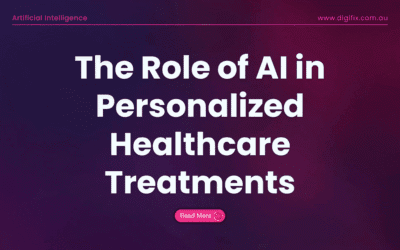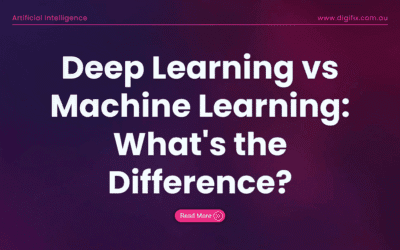The arrival of AI technologies is changing the global job scene. It’s causing worries about job displacement and job creation. As companies in Australia and around the world use AI to improve work, people are getting more concerned about jobs.
Companies like DigiFix, a top AI agency in Melbourne, are leading the way. They use AI to make businesses better. This helps companies stay ahead of the competition and deal with the changing job world.
The worries about losing jobs and creating new ones are key to understanding the future of work. This article will look at how AI affects jobs. We’ll see both the problems and the chances it brings. The worries of losing jobs & creating new ones are key to understanding the Artificial Intelligence and the Future of Work.
The Evolution of Artificial Intelligence in the Workplace
The workplace is on the brink of a big change, thanks to AI. Businesses in Australia and worldwide are starting to use AI. It’s key to know how this tech has grown and what it’s like in the workplace now.
From Automation to Intelligence: A Brief History
AI’s journey in the workplace started with making tasks easier. Now, AI can handle more complex tasks. It uses machine learning and deep learning for intelligent decision-making.
Key Milestones in AI Development
- The first AI program, ELIZA, was made in 1966, starting AI research.
- In the 1980s, expert systems were developed, mimicking human decisions.
- In the 21st century, AI got a boost from machine learning and big data.
The Acceleration of AI Adoption Post-Pandemic
The COVID-19 pandemic made businesses quickly adopt AI. They needed to work remotely and change digitally. This fast adoption led to more investment in AI, pushing innovation and efficiency.

Current State of AI Implementation in Australian Businesses
Australian companies are using AI to work better and stay ahead. Recent data shows more businesses are using or planning to use AI.
Statistics and Trends
Many Australian businesses are using AI or planning to soon. They see AI as a way to boost productivity and cut costs.
Comparative Analysis with Global Markets
Australia is keeping up with the world in AI adoption, but at its own pace. The country is careful but hopeful about AI’s benefits. This matches the global move towards an AI-driven future of work.
Understanding the Dual Impact of AI on Employment
Artificial Intelligence (AI) is changing how we work, bringing both good and bad changes. It’s key to grasp how AI affects jobs.
The Reality of Job Displacement
AI might take over some jobs. It can do tasks that humans used to do, which could lead to job losses.
Tasks vs. Jobs: What’s Actually Being Automated
It’s important to know the difference between tasks and jobs. AI might make some tasks easier, but it won’t replace all jobs. For example, in healthcare, AI helps with diagnosis, but humans are still needed for patient care and making tough decisions.
Timeline Projections for Different Sectors
| Sector | Projected Timeline for Significant AI Adoption | Potential Jobs Affected |
|---|---|---|
| Manufacturing | 2025-2030 | Assembly Line Workers, Quality Control Inspectors |
| Customer Service | 2023-2028 | Call Centre Operators, Chatbot Support |
| Transportation | 2030-2035 | Drivers, Logistics Coordinators |
The Promise of New Job Creation
AI might take some jobs, but it also brings new ones. History shows that new tech leads to new jobs.
Historical Parallels with Previous Technological Revolutions
The Industrial Revolution created new jobs in manufacturing and management. The IT revolution brought us software developers and IT specialists.
Emerging Job Categories in the AI Economy
New jobs are coming, like AI ethicists, data scientists, and AI trainers. These roles need a deep understanding of AI.
Looking to use AI to improve your work? DigiFix’s team can help. They ensure you’re ready for the future of work.
Industries Most Vulnerable to AI Disruption
AI technology is changing fast, and some industries are facing big challenges. These are mainly those with tasks that can be easily automated. This includes repetitive, routine, or predictable jobs.
Manufacturing and Production
The manufacturing sector is very likely to be affected by AI. This is because of new robotics and smart factory technologies.
Robotics and Smart Factories
Robots are now used in manufacturing for jobs like assembly and welding. Smart factories use AI, robotics, and IoT to make production more efficient.
Customer Service and Retail
The customer service and retail sectors are also seeing big changes. This is thanks to AI chatbots and personalisation algorithms.
Chatbots and Personalisation Algorithms
Chatbots help with customer questions and support. They can even handle transactions. Personalisation algorithms give customers tailored recommendations based on their shopping history.
| Industry | AI Technology | Impact |
|---|---|---|
| Manufacturing | Robotics, Smart Factories | Increased Efficiency, Job Displacement |
| Customer Service | Chatbots, Personalisation Algorithms | Improved Customer Experience, Job Redefinition |
| Transportation | Autonomous Vehicles | Enhanced Safety, Potential Job Losses |
Transportation and Logistics
The transportation sector is set for a big change. This is thanks to autonomous vehicles and route optimisation technologies.
Autonomous Vehicles and Route Optimisation
Autonomous vehicles could change the transportation industry. They could make it safer and cut costs. Route optimisation algorithms help logistics companies save fuel and reduce emissions.
Administrative and Clerical Work
AI is also changing administrative and clerical tasks. This includes document processing and scheduling automation.
Document Processing and Scheduling Automation
AI can automate tasks like data entry and document classification. Scheduling automation software makes managing appointments more efficient.
Knowing which industries are most at risk from AI can help businesses prepare. DigiFix offers expert advice on using AI to stay ahead in the market.
Emerging Opportunities: New Roles in the AI Era
AI is changing the job market in exciting ways. It’s not just about automating tasks. It’s opening up new career paths across different industries.
AI Specialists and Data Scientists
AI specialists and data scientists are in high demand. Companies want to use AI to grow. These experts help make and use AI solutions.
Skills and Qualifications in Demand
To do well in these jobs, you need to know programming, data analysis, and machine learning. Key skills include knowing Python, R, and SQL, and using AI tools.
| Skill | Description | Importance Level |
|---|---|---|
| Programming | Proficiency in languages such as Python, R | High |
| Data Analysis | Ability to interpret complex data sets | High |
| Machine Learning | Understanding of algorithms and models | High |
Human-AI Collaboration Experts
As AI becomes more common in work, we need experts in human-AI teamwork. They make sure AI works well with people.
The Growing Importance of Human Oversight
It’s vital to have humans check AI to keep it ethical and on track. Experts in human-AI collaboration help design systems that work well and are fair.
Ethical AI Governance Roles
AI raises big ethical questions. New roles focus on making sure AI is used right.
Ensuring Responsible AI Implementation
People in ethical AI governance create rules for using AI. They make sure AI is transparent, fair, and accountable.
Industry-Specific AI Roles
AI is used in many fields, like healthcare, finance, and creative industries. Each area needs experts who know the tech and the specific challenges.
Healthcare, Finance, and Creative Industries
In healthcare, AI helps with diagnosis and personalized medicine. Finance uses AI for risk and fraud checks. The creative world uses AI for making new content.
DigiFix offers AI strategy sessions and training. They help businesses and workers get ready for the AI future.
Artificial Intelligence and the Future of Work: Preparing Your Business
AI is changing how industries work. Companies need to check if they’re ready to use this technology well. Getting ready for the future of work means looking at several areas, like how ready you are, how to use AI, and training your team.
Assessing Your Organisation’s AI Readiness
Before starting with AI, you must check if your business is ready. This means looking at two main things:
Technical Infrastructure Evaluation
First, check your technical setup. Look at your computers, software, and how you manage data. Make sure they can work with AI.
Cultural Readiness Assessment
It’s also key to see if your team is ready for AI. Understand if your team wants to use AI, if they have the right skills, and if you need to change your culture.
Developing an AI Integration Strategy
After checking your readiness, create a plan for using AI. This plan should cover a few important steps:
Identifying High-Value Use Cases
Find areas in your business where AI can really help. This could be making customer service better or making operations more efficient.
Building vs. Buying AI Solutions
Choose whether to make AI solutions yourself or buy them. This choice depends on your skills, budget, and goals.
| Consideration | Building AI Solutions | Buying AI Solutions |
|---|---|---|
| Cost | High initial investment | Variable costs; often subscription-based |
| Customisation | Highly customisable | Limited customisation options |
| Expertise Required | Significant in-house AI expertise needed | Less reliance on in-house AI expertise |
Upskilling Your Workforce for the AI Age
As AI grows, your team needs new skills. This means:
Critical Skills for the AI-Enhanced Workplace
Find out what skills your team needs for an AI world. This includes skills like data analysis, understanding AI, and thinking critically.
Training Approaches and Resources
Create training that fills skill gaps. This could be workshops, online classes, or working with schools.
By following these steps, businesses can get ready for the AI future. DigiFix helps companies use AI to improve how they work and stay ahead.
How Australian Businesses Are Leveraging AI Today
Australian businesses are embracing AI, leading to growth and efficiency. Companies in Melbourne and elsewhere are seeing big changes. They’re using AI in many ways to improve their work.
Case Studies: Successful AI Implementation in Melbourne
Melbourne is a hub for AI innovation. Companies of all sizes are using AI to boost their work. AI is being used in many different ways.
Small Business Applications
Small businesses in Melbourne are using AI to make things easier and better for customers. AI chatbots help with customer questions. This lets staff focus on more important tasks.
Enterprise-Level Transformations
Big companies are also using AI to change a lot. They’re using AI to improve their supply chains and predict market trends. They’re also making their marketing more personal.
Lessons Learned and Best Practices
As businesses use AI, they learn important lessons and develop best practices. These can help other companies with their AI journey.
Common Implementation Challenges
Businesses face challenges when using AI. These include poor data quality, integrating AI with current systems, and making sure AI is used ethically. Solving these problems is key to successful AI use.
Success Factors and Strategies
To tackle these challenges, businesses use different strategies. They invest in good data, create clear AI policies, and train staff to work with AI.
| Success Factor | Strategy | Benefit |
|---|---|---|
| High-Quality Data | Invest in data cleansing and validation | Improved AI accuracy |
| Clear AI Governance | Develop and implement AI policies | Ethical AI use and reduced risk |
| Upskilled Workforce | Provide AI training and development programs | Effective human-AI collaboration |
Learning from Australian businesses can help other companies understand AI’s benefits and challenges. DigiFix, a leading AI agency, says success comes from careful planning, strategic investment, and training staff.
DigiFix’s Approach to AI Automation in Melbourne
DigiFix is a leader in AI automation for Melbourne businesses. They help organisations use AI to boost efficiency and innovation.
Custom AI Strategy Sessions & Implementation Plans
DigiFix starts by understanding each business’s unique needs. They offer custom AI strategy sessions to find opportunities for growth.
Business Analysis and Opportunity Identification
- They do a detailed analysis of current business processes.
- They find areas ready for AI automation.
- They check how AI will affect operations and the workforce.
Roadmap Development and Execution Support
Then, DigiFix creates a custom AI roadmap. They offer ongoing support for a smooth implementation. This includes change management and technical integration services.
Content Generation Using AI
DigiFix uses AI for content creation. This boosts productivity and consistency in various business areas.
Marketing Content Automation
- They automate marketing material creation.
- They make content personal for better customer engagement.
Document Processing and Analysis
AI makes document processing faster and more accurate. This frees up human resources for more important tasks.
AI Training & Workshops for Your Team
DigiFix offers AI training and workshops. This empowers businesses to develop their own AI skills.
Building Internal AI Capabilities
- They have training programs for specific business needs.
- They run workshops on AI best practices and trends.
Ongoing Support and Knowledge Transfer
DigiFix provides ongoing support. They make sure businesses get the most from their AI investments.
By working with DigiFix, Melbourne businesses can tackle AI automation. This drives growth and keeps them competitive. Book your consultation now for AI success.
Measuring the ROI of AI Implementation
As more businesses use AI, it’s key to measure the return on investment (ROI). DigiFix makes sure AI is integrated well, helping businesses see its benefits.
Productivity and Efficiency Gains
AI can greatly improve productivity and efficiency. It automates tasks and optimises processes, letting businesses do more with less.
Time Savings and Process Improvements
AI saves a lot of time, letting staff focus on important tasks. It also makes processes smoother, cutting down on delays and boosting efficiency.
Quality and Consistency Enhancements
AI keeps quality consistent, cutting down on mistakes. This is especially useful where accuracy is critical.
Cost Reduction and Resource Optimisation
AI can also cut costs and optimise resources. It helps reduce waste and better use resources, saving money.
Labour Cost Savings vs. Investment Requirements
While AI costs money upfront, it can save on labour costs in the long run. Businesses need to compare these savings to the initial cost to see the real ROI.
Long-term Financial Impact Analysis
It’s vital to do a deep financial impact analysis to see AI’s long-term benefits. This should look at all costs and benefits, both direct and indirect.
Competitive Advantage in the Marketplace
Using AI can give a big competitive edge in the market. It helps businesses stand out and improve their market position.
Innovation Capacity and Market Differentiation
AI helps businesses innovate and stand out with their products and services. This is key to staying competitive.
Customer Experience Improvements
AI can also make customer experiences better. It personalises interactions and improves service, boosting customer happiness and loyalty.
Conclusion: Embracing AI for Business Success
Artificial intelligence (AI) is changing the job market in many ways. It brings both challenges and chances for growth. As AI gets better, it will change jobs a lot, making some roles obsolete but also creating new ones.
Australian businesses need to get ready for this change. They should look at how AI might affect their jobs and find ways to use it to improve. DigiFix is helping businesses adapt by offering AI strategy sessions and plans.
Starting to use AI can open up new chances for growth. AI will be very important in the future of work. Businesses that embrace AI and use it well will likely do well, especially in understanding AI’s role in the future.





0 Comments